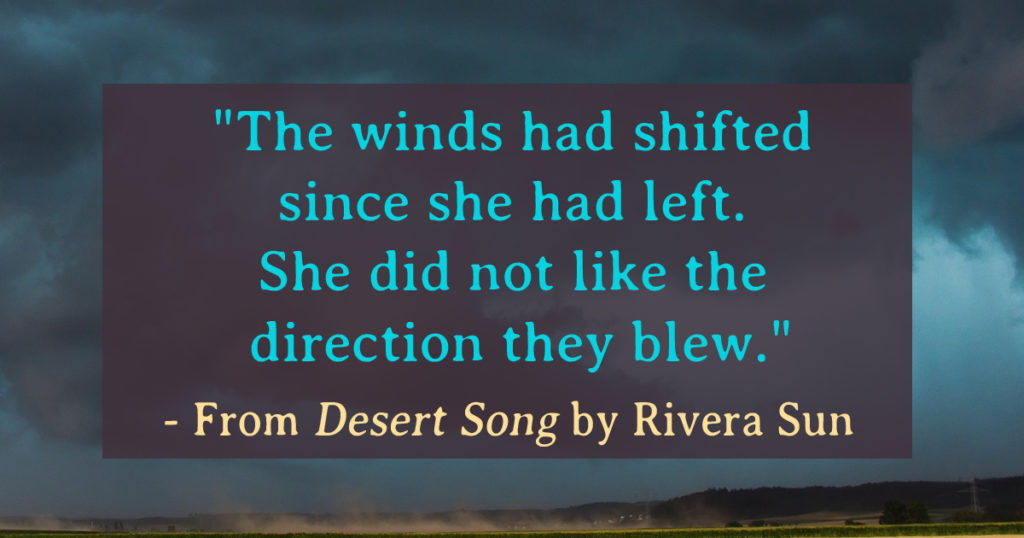
This is an excerpt from Desert Song by Rivera Sun. You can get a copy here.
The night pooled around Mahteni, magnificent in its depth. Moonlight silvered the wide plain. The wind rippled the grasses like marsh reeds quivering in the currents’ flow. Piles of rock and a few twisted old trees dotted the flat expanse, scattered like giant’s crumbs across the floor. They crouched, dark with shadows, unknowable in their hidden mysteries.
Mahteni rode quietly through the shine of silver, letting the horse pick her way through the grasses. The light wind lifted the curls from her face. The cool air quieted her worried heart. The expanse of night made room for her thoughts as she mulled on all she had seen and heard. She had detoured up a foothill trail to visit a village and speak with the elders. Their hesitant comments and murmured asides confirmed what she had noticed in Turim. The winds had shifted since she had left six years ago.
She did not like the direction they blew.
Once and always, until now, men and women stood as equals in Harraken culture. A boy could spin and weave; a girl could hunt and ride. A man could tend the hearth fire and children; a woman could work the forges or ride to war. Decisions were made by everyone, all together, at the village sings. At least, that’s what Mahteni’s memory insisted. But, she reluctantly admitted, that was over a decade ago. During the five years of war, the warriors had commanded absolute authority. At the end of those terrifying times, she had gone into Mariana disguised as a water worker. She had heard reports that the warriors had been reluctant to give up control, even after the first tenuous years of ceasefire had ended. Three years ago, her brother had written about his relief that the first village sing had started up again . . . but his hope for peace was short-lived. Just before Ari Ara was found, the Marianans had threatened to invade again, convinced the desert people had taken their heir. The Harraken shifted back to warriors-rule, worried about the possibility of attack. But the war had been averted, and a time of peace had arrived. The village sings ought to have been restored; the Harrak-Mettahl should have insisted on it, but Tahkan had neglected his duties in order to sneak into Mariana to meet his daughter. She did not blame him for that choice, but she also saw the mess he had left behind. With the warriors barring women from the meets, the decisions slanted toward their priorities . . . and that shift was reflected in the changes in their culture.
During the welcoming feast in Turim, and again at this village, she had sat among one family and then the next, offering the Shirar family’s greetings, listening to the news and gossip . . . and noticing the things left unsaid. She silently watched the women rise and serve the men. Her green eyes followed the shushing of girls and the pampering of boys. She kept track of who did the talking and whose sentences were trampled by another. She watched to see who lent a hand with the dishwashing, and who sat with feet up on the tables, picking their teeth with a belt-knife. She joined the women in peeling fruit and chopping vegetables, asking after this woman or that friend, carefully tracking whose fathers or brothers were now named as leaders where once mothers and sisters had earned that praise. She questioned the old women about the frequency of the village sings and watched the heads shake. In many places, there hadn’t been a village sing – a real one with everyone involved – for months, sometimes years.
The grandmothers who had grown up before the war yearned for the fairness of the village sings. Their lined faces crinkled with distaste as they complained about warriors-rule. It was one thing for the warriors to assume the mantle of authority when the Harraken were under attack, but in times of peace, warriors should not be settling disputes over wandering chickens and broken hearts and which fields to plant with what crops. How would they understand why one grandmother couldn’t share a house with another, but must be respectfully accommodated at the other end of the village? How could they know that the rocky field would support kerat grain, but would need twice as much water? How would the warriors know the importance of negotiating clay rights evenly among the potters? How would they understand the need to allocate timber harvests for new looms instead of spears and shields?
When voices are silenced from the Harraken Song, Mahteni thought darkly, the music is not complete. The decisions weakened and faltered. The harmony became unclear. Discord was sown between people. Resentments built into hatred.
_______________________
This is an excerpt from Desert Song by Rivera Sun. You can get a copy here.